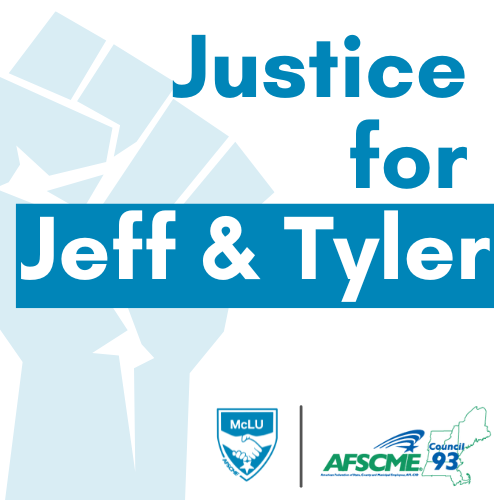FROM AFSCME BLOG- https://www.afscme.org/blog/the-union-difference-brings-justice-to-wrongly-fired-psychiatric-hospital-workers
Something wasn’t adding up for Tyler Rioff and Jeff Heithmar, two wrongly terminated employees of McLean Hospital in Massachusetts who got justice through their union.
Rioff, a nurse, saw a paradox. On the one hand, McLean was a prestigious psychiatric center, part of the storied Mass General Brigham hospital system. But when Rioff started at McLean as a mental health specialist on an inpatient floor, he noticed that no one stayed long.
“From the moment I arrived, I experienced knowledgeable, skilled leaders constantly quitting,” recalls Rioff. “The best and the brightest were always looking for greener pastures. Working conditions were unsustainable.”
Still, he was optimistic that he could have a career at McLean. “I envisioned myself learning and growing there. I had hopes to build a career there. The hospital does amazing things.”
Heithmar, a mental health specialist and residential counselor, shared a similar vision.
“I really loved working there,” recalls Heithmar. “I was gung-ho to make my career there. I was working three different jobs there, working overtime — I loved it.”
Despite their enthusiasm for the work itself, both Rioff and Heithmar — and, they would learn, many of their co-workers — couldn’t ignore the fact that they were being treated with disrespect, put into dangerous situations and undervalued.
For Rioff, it started with the turnover, which jeopardized patient safety. But there were other problems as well.
When the COVID-19 pandemic began, Rioff said hospital leadership seemed to have no plans whatsoever — either for keeping patients or staff safe. Even plans for seemingly simple things, like how to separate COVID-positive patients from other patients, were effectively nonexistent when COVID began to trickle in.
Both Heithmar and Rioff point to the fact that the hospital took away the staff’s accrued sick days, robbing many of sick days they had earned and leaving some to exhaust their days when they came down with COVID.
“That struck us as super cruel and frustrating,” said Rioff.
Heithmar also said the pay was well below what similar hospitals paid.
“The pay wasn’t adding up,” recalls Heithmar. “With McLean being a prestigious hospital, paying us $20 an hour … other [hospitals within the same MGB network] were paying significantly more. Being the person at the bottom of the totem pole, I wanted to have a say in this. I thought we deserved more.”
Fired up and fighting back
During COVID, Rioff says workers in various roles across the nursing staff gathered signatures for a petition asking the hospital for hazard pay, having endured conditions that they were not trained for and having suffered the emotional burden of serving on the front lines of the pandemic.
“We were flatly denied,” says Rioff.
But staff was mobilized, hungry for a voice on the job, and, in the spring and into the summer of 2021, they began a push to unionize, finding leaders on every unit and facilitating discussions about how to improve working conditions across McLean.
‘They painted us as union thugs. That strategy backfired.”
By the fall of 2021, as their organizing committee coalesced and the unionization efforts began to take firmer shape, Rioff, Heithmar and others took to social media and created fliers to educate their fellow workers about what a union was and what it could do for them.
“The administration started their full-force anti-union campaign,” recalls Rioff. “They brought in expensive consultants, who led mandatory all-staff meetings, taking us away from our patients to try to convince us that the hospital had our best interests in mind. By the fall, the administration realized there was a real possibility we would win in a potential election. They started to tear down our flyers and our pamphlets.”
In early March, Rioff and Heithmar happened to run into each other in an entryway, where two boxes of anti-union flyers sat waiting to be distributed around the hospital.
It seemed unfair: McLean had destroyed the pro-union materials that had been placed in similar spaces. The workers were told that pro-union materials were forbidden from even being in those spaces. Why should the hospital be allowed to spread anti-union messaging?
So, Rioff and Heithmar discarded the anti-union propaganda.
Within days, they were summoned to meet with human resources, where each, without a single disciplinary note in their record, were fired for “egregious theft and destruction of hospital property.”
They were stunned and traumatized.
To fire two model employees without so much as a warning was unheard of. Heithmar described the Zoom call as a “verbal lashing.” Both were made to feel that their futures as health care providers in the Boston area were in jeopardy, that they would carry the blemish of their terminations through their careers.
“It was a really clear callous, political move,” said Rioff, who believes the hospital must have hoped their firing would have a chilling effect on the unionization effort. “They painted us as union thugs. That strategy backfired on them. The colleagues who had worked alongside us for years were the ones casting votes in the election, and they supported us.”
Justice, with a price
Attorneys for AFSCME Council 93 immediately filed an unfair labor practice with the National Labor Relations Board (NLRB), alleging that the firing interfered with the workers’ legally protected right to form a union.
The NLRB investigated whether Rioff’s and Heithmar’s terminations were due to their union activities, and as a result of that investigation, McLean chose to settle, awarding them sizable settlements that included back pay, interest and damages. McLean removed any reference to the terminations from their files. The firings can’t be used against them in any way.
And, about a month later and despite McLean’s efforts, the workers at the hospital would choose to join AFSCME Council 93, an effort Rioff and Heithmar continued to support even after their firing.
As chilling as the ordeal was for Rioff and Heithmar, they stand by their choice to form a union and believe in the right of workers to have a voice on the job.
“The collective power [of a union],” says Rioff, “speaks for itself.”

